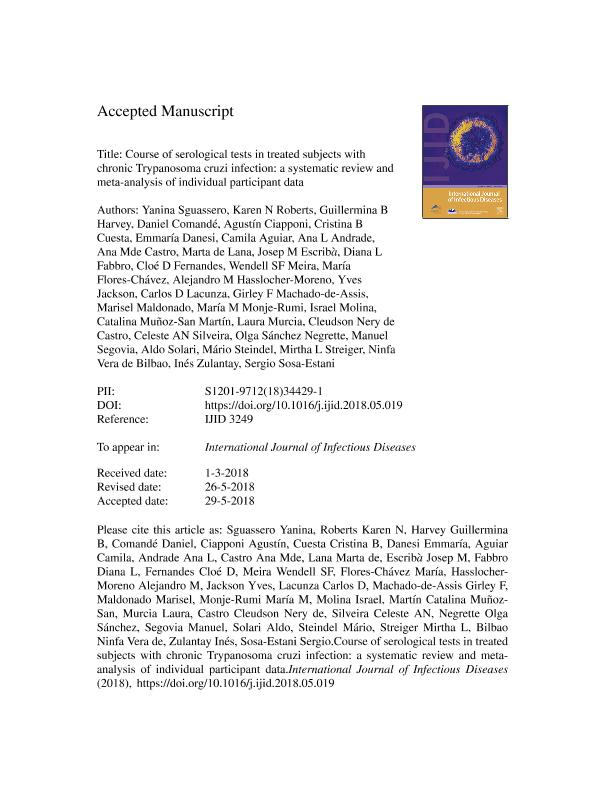Artículo
Course of serological tests in treated subjects with chronic Trypanosoma cruzi infection: A systematic review and meta-analysis of individual participant data
Sguassero, Yanina; Roberts, Karen Natalí; Harvey, Guillermina Beatriz; Comandé, Daniel; Ciapponi, Agustín ; Cuesta, Cristina Beatriz; Danesi, Emmaría; Aguiar, Camila; Andrade, Ana L.; de Castro, Ana M.; de Lana, Marta; Escribà, Josep M.; Fabbro, Diana Lucrecia; Fernandes, Cloé D.; Meira, Wendell S. F.; Flores Chávez, María; Hasslocher Moreno, Alejandro M.; Jackson, Yves; Lacunza, Carlos Diego; Machado de Assis, Girley F.; Maldonado, Marisel; Monje Rumi, María M.; Molina, Israel; Muñoz San Martín, Catalina; Murcia, Laura; Nery de Castro, Cleudson; Silveira, Celeste A. N.; Sánchez Negrette, Olga; Segovia, Manuel; Solari, Aldo; Steindel, Mário; Streiger, Mirtha L.; de Bilbao, Ninfa Vera; Zulantay, Inés; Sosa-Estani, Sergio Alejandro
; Cuesta, Cristina Beatriz; Danesi, Emmaría; Aguiar, Camila; Andrade, Ana L.; de Castro, Ana M.; de Lana, Marta; Escribà, Josep M.; Fabbro, Diana Lucrecia; Fernandes, Cloé D.; Meira, Wendell S. F.; Flores Chávez, María; Hasslocher Moreno, Alejandro M.; Jackson, Yves; Lacunza, Carlos Diego; Machado de Assis, Girley F.; Maldonado, Marisel; Monje Rumi, María M.; Molina, Israel; Muñoz San Martín, Catalina; Murcia, Laura; Nery de Castro, Cleudson; Silveira, Celeste A. N.; Sánchez Negrette, Olga; Segovia, Manuel; Solari, Aldo; Steindel, Mário; Streiger, Mirtha L.; de Bilbao, Ninfa Vera; Zulantay, Inés; Sosa-Estani, Sergio Alejandro
 ; Cuesta, Cristina Beatriz; Danesi, Emmaría; Aguiar, Camila; Andrade, Ana L.; de Castro, Ana M.; de Lana, Marta; Escribà, Josep M.; Fabbro, Diana Lucrecia; Fernandes, Cloé D.; Meira, Wendell S. F.; Flores Chávez, María; Hasslocher Moreno, Alejandro M.; Jackson, Yves; Lacunza, Carlos Diego; Machado de Assis, Girley F.; Maldonado, Marisel; Monje Rumi, María M.; Molina, Israel; Muñoz San Martín, Catalina; Murcia, Laura; Nery de Castro, Cleudson; Silveira, Celeste A. N.; Sánchez Negrette, Olga; Segovia, Manuel; Solari, Aldo; Steindel, Mário; Streiger, Mirtha L.; de Bilbao, Ninfa Vera; Zulantay, Inés; Sosa-Estani, Sergio Alejandro
; Cuesta, Cristina Beatriz; Danesi, Emmaría; Aguiar, Camila; Andrade, Ana L.; de Castro, Ana M.; de Lana, Marta; Escribà, Josep M.; Fabbro, Diana Lucrecia; Fernandes, Cloé D.; Meira, Wendell S. F.; Flores Chávez, María; Hasslocher Moreno, Alejandro M.; Jackson, Yves; Lacunza, Carlos Diego; Machado de Assis, Girley F.; Maldonado, Marisel; Monje Rumi, María M.; Molina, Israel; Muñoz San Martín, Catalina; Murcia, Laura; Nery de Castro, Cleudson; Silveira, Celeste A. N.; Sánchez Negrette, Olga; Segovia, Manuel; Solari, Aldo; Steindel, Mário; Streiger, Mirtha L.; de Bilbao, Ninfa Vera; Zulantay, Inés; Sosa-Estani, Sergio Alejandro
Fecha de publicación:
08/2018
Editorial:
Elsevier
Revista:
International Journal of Infectious Diseases
ISSN:
1201-9712
Idioma:
Inglés
Tipo de recurso:
Artículo publicado
Clasificación temática:
Resumen
Objective: To determine the course of serological tests in subjects with chronic Trypanosoma cruzi infection treated with anti-trypanosomal drugs. Methods: A systematic review and meta-analysis was conducted using individual participant data. Survival analysis and the Cox proportional hazards regression model with random effects to adjust for covariates were applied. The protocol was registered in the PROSPERO database (http://www.crd.york.ac.uk/PROSPERO; CRD42012002162). Results: A total of 27 studies (1296 subjects) conducted in eight countries were included. The risk of bias was low for all domains in 17 studies (63.0%). Nine hundred and thirteen subjects were assessed (149 seroreversion events, 83.7% censored data) for enzyme-linked immunosorbent assay (ELISA), 670 subjects (134 events, 80.0% censored) for indirect immunofluorescence assay (IIF), and 548 subjects (99 events, 82.0% censored) for indirect hemagglutination assay (IHA). A higher probability of seroreversion was observed within a shorter time span in subjects aged 1–19 years compared to adults. The chance of seroreversion also varied according to the country where the infection might have been acquired. For instance, the pooled adjusted hazard ratio between children/adolescents and adults for the IIF test was 1.54 (95% confidence interval 0.64–3.71) for certain countries of South America (Argentina, Bolivia, Chile, and Paraguay) and 9.37 (95% confidence interval 3.44–25.50) for Brazil. Conclusions: The disappearance of anti-T. cruzi antibodies was demonstrated along the course of follow-up. An interaction between age at treatment and country setting was found.
Archivos asociados
Licencia
Identificadores
Colecciones
Articulos(CIESP)
Articulos de CENTRO DE INVESTIGACIONES EN EPIDEMIOLOGIA Y SALUD PUBLICA
Articulos de CENTRO DE INVESTIGACIONES EN EPIDEMIOLOGIA Y SALUD PUBLICA
Citación
Sguassero, Yanina; Roberts, Karen Natalí; Harvey, Guillermina Beatriz; Comandé, Daniel; Ciapponi, Agustín; et al.; Course of serological tests in treated subjects with chronic Trypanosoma cruzi infection: A systematic review and meta-analysis of individual participant data; Elsevier; International Journal of Infectious Diseases; 73; 8-2018; 93-101
Compartir
Altmétricas



